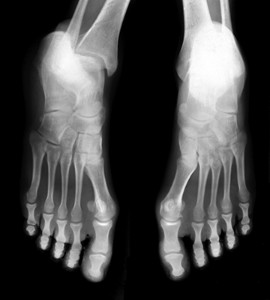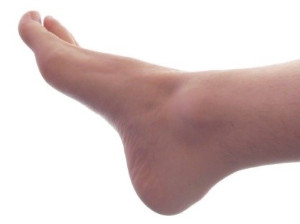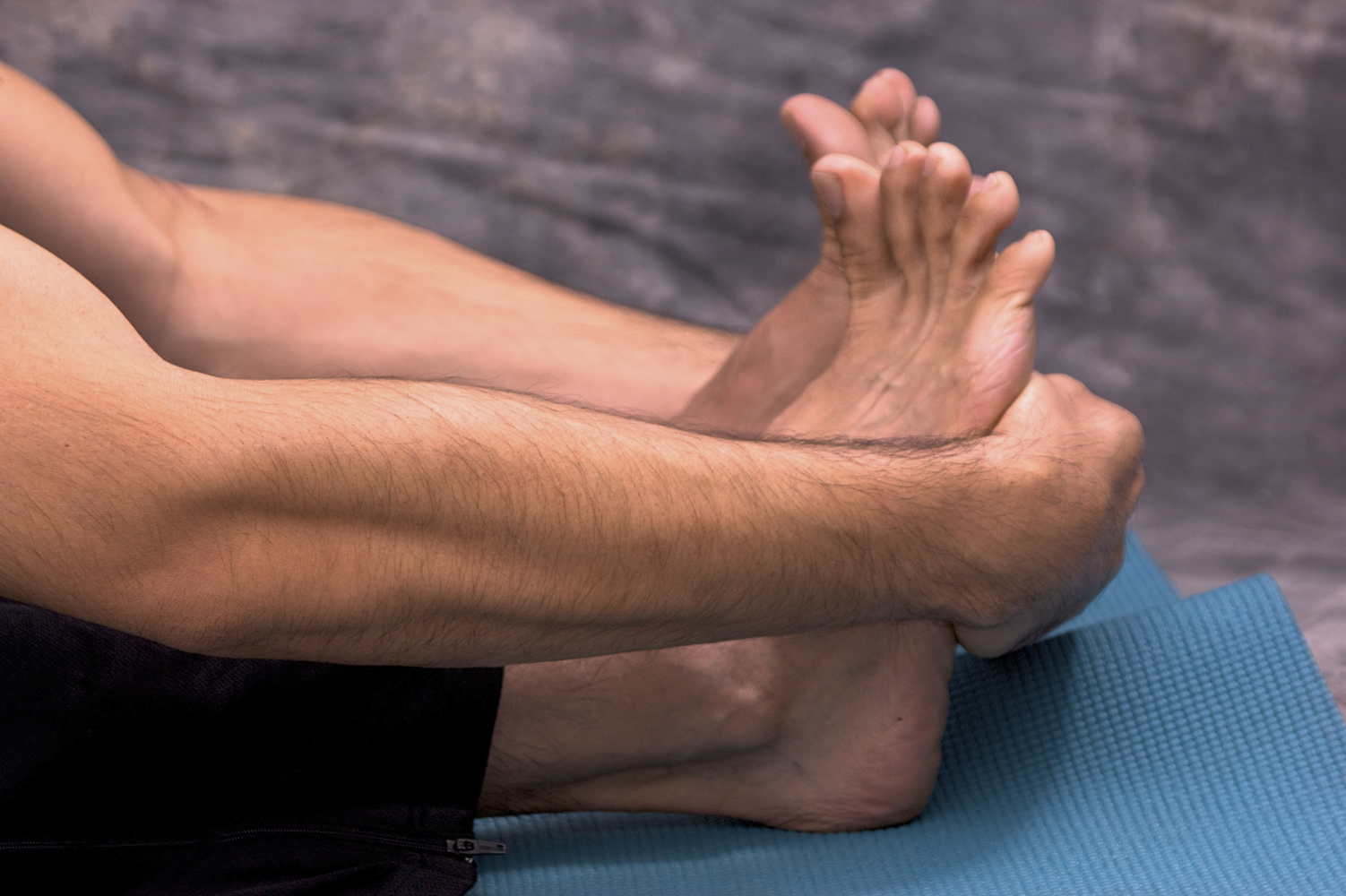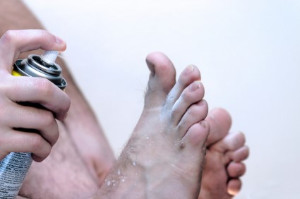Items filtered by date: August 2017
Bunions and X-ray Imaging
 Researchers from South Korea have discovered a new method to predict if bunions will reemerge after surgery. The team utilized X-ray imaging and identified reemergence as a hallux valgus angle (HVA) of 20 degrees or more. Using this information, the team was able to predict the recurrence of bunions. Recurrence was more likely if the postoperative HVA was eight degrees or more. An HVA of 40 degrees or more also increased the likelihood of reemergence after surgery. The researchers are hopeful that more research will confirm the data, as this could help future surgeries and patients.
Researchers from South Korea have discovered a new method to predict if bunions will reemerge after surgery. The team utilized X-ray imaging and identified reemergence as a hallux valgus angle (HVA) of 20 degrees or more. Using this information, the team was able to predict the recurrence of bunions. Recurrence was more likely if the postoperative HVA was eight degrees or more. An HVA of 40 degrees or more also increased the likelihood of reemergence after surgery. The researchers are hopeful that more research will confirm the data, as this could help future surgeries and patients.
If you are suffering from bunions, contact the podiatrists of Associated Podiatric Physicians, PA. Our doctors can provide the care you need to keep you pain-free and on your feet.
What Is a Bunion?
A bunion is formed of swollen tissue or an enlargement of boney growth, usually located at the base joint of the toe that connects to the foot. The swelling occurs due to the bones in the big toe shifting inward, which impacts the other toes of the foot. This causes the area around the base of the big toe to become inflamed and painful.
Why Do Bunions Form?
Genetics – Susceptibility to bunions are often hereditary
Stress on the feet – Poorly fitted and uncomfortable footwear that places stress on feet, such as heels, can worsen existing bunions
How Are Bunions Diagnosed?
Doctors often perform two tests – blood tests and x-rays – when trying to diagnose bunions, especially in the early stages of development. Blood tests help determine if the foot pain is being caused by something else, such as arthritis, while x-rays provide a clear picture of your bone structure to your doctor.
How Are Bunions Treated?
- Refrain from wearing heels or similar shoes that cause discomfort
- Select wider shoes that can provide more comfort and reduce pain
- Anti-inflammatory and pain management drugs
- Orthotics or foot inserts
- Surgery
If you have any questions, please feel free to contact our office located in Hamilton Township, NJ. We offer the newest diagnostic and treatment technologies for all your foot care needs.
Read more about BunionsBunions and X-ray Imaging
 Researchers from South Korea have discovered a new method to predict if bunions will reemerge after surgery. The team utilized X-ray imaging and identified reemergence as a hallux valgus angle (HVA) of 20 degrees or more. Using this information, the team was able to predict the recurrence of bunions. Recurrence was more likely if the postoperative HVA was eight degrees or more. An HVA of 40 degrees or more also increased the likelihood of reemergence after surgery. The researchers are hopeful that more research will confirm the data, as this could help future surgeries and patients.
Researchers from South Korea have discovered a new method to predict if bunions will reemerge after surgery. The team utilized X-ray imaging and identified reemergence as a hallux valgus angle (HVA) of 20 degrees or more. Using this information, the team was able to predict the recurrence of bunions. Recurrence was more likely if the postoperative HVA was eight degrees or more. An HVA of 40 degrees or more also increased the likelihood of reemergence after surgery. The researchers are hopeful that more research will confirm the data, as this could help future surgeries and patients.
If you are suffering from bunions, contact Donald Manger, DPM of Associated Podiatric Physicians, PA. Our doctor can provide the care you need to keep you pain-free and on your feet.
What Is a Bunion?
A bunion is formed of swollen tissue or an enlargement of boney growth, usually located at the base joint of the toe that connects to the foot. The swelling occurs due to the bones in the big toe shifting inward, which impacts the other toes of the foot. This causes the area around the base of the big toe to become inflamed and painful.
Why Do Bunions Form?
Genetics – Susceptibility to bunions are often hereditary
Stress on the feet – Poorly fitted and uncomfortable footwear that places stress on feet, such as heels, can worsen existing bunions
How Are Bunions Diagnosed?
Doctors often perform two tests – blood tests and x-rays – when trying to diagnose bunions, especially in the early stages of development. Blood tests help determine if the foot pain is being caused by something else, such as arthritis, while x-rays provide a clear picture of your bone structure to your doctor.
How Are Bunions Treated?
- Refrain from wearing heels or similar shoes that cause discomfort
- Select wider shoes that can provide more comfort and reduce pain
- Anti-inflammatory and pain management drugs
- Orthotics or foot inserts
- Surgery
If you have any questions, please feel free to contact our office located in Hamilton Township, NJ . We offer the newest diagnostic and treatment technologies for all your foot care needs.
Everyday Foot Care
 There are many different ways to keep your feet healthy in the summertime. One of the best ways to get your feet in shape this season is to trim your toenails or opt to get a pedicure. A quote from experts at the National Health Services reads, “Use proper nail clippers and cut straight across – not too short, and not down at the corners, as this can lead to ingrown nails. File them, if that’s easier.” You should also change your socks on a daily basis, especially on hot days. The socks you wear should be made of at least 70% cotton or wool in order to keep your feet dry.
There are many different ways to keep your feet healthy in the summertime. One of the best ways to get your feet in shape this season is to trim your toenails or opt to get a pedicure. A quote from experts at the National Health Services reads, “Use proper nail clippers and cut straight across – not too short, and not down at the corners, as this can lead to ingrown nails. File them, if that’s easier.” You should also change your socks on a daily basis, especially on hot days. The socks you wear should be made of at least 70% cotton or wool in order to keep your feet dry.
Everyday foot care is very important to prevent infection and other foot ailments. If you need your feet checked, contact the podiatrists from Associated Podiatric Physicians, PA. Our doctors can provide the care you need to keep you pain-free and on your feet.
Everyday Foot Care
Often, people take care of their bodies, face and hair more so than they do for their feet. But the feet are a very important aspect of our bodies, and one that we should pay more attention to. Without our feet, we would not be able to perform most daily tasks.
It is best to check your feet regularly to make sure there are no new bruises or cuts that you may not have noticed before. For dry feet, moisturizer can easily be a remedy and can be applied as often as necessary to the affected areas. Wearing shoes that fit well can also help you maintain good foot health, as well as making it easier to walk and do daily activities without the stress or pain of ill-fitting shoes, high heels, or even flip flops. Wearing clean socks with closed shoes is important to ensure that sweat and bacteria do not accumulate within the shoe. Clean socks help to prevent Athlete’s foot, fungi problems, bad odors, and can absorb sweat.
If you have any questions please feel free to contact our office located in Hamilton Township, NJ. We offer the newest diagnostic and treatment technologies for all your foot and ankle needs.
Read more about Every Day Foot CareEveryday Foot Care
 There are many different ways to keep your feet healthy in the summertime. One of the best ways to get your feet in shape this season is to trim your toenails or opt to get a pedicure. A quote from experts at the National Health Services reads, “Use proper nail clippers and cut straight across – not too short, and not down at the corners, as this can lead to ingrown nails. File them, if that’s easier.” You should also change your socks on a daily basis, especially on hot days. The socks you wear should be made of at least 70% cotton or wool in order to keep your feet dry.
There are many different ways to keep your feet healthy in the summertime. One of the best ways to get your feet in shape this season is to trim your toenails or opt to get a pedicure. A quote from experts at the National Health Services reads, “Use proper nail clippers and cut straight across – not too short, and not down at the corners, as this can lead to ingrown nails. File them, if that’s easier.” You should also change your socks on a daily basis, especially on hot days. The socks you wear should be made of at least 70% cotton or wool in order to keep your feet dry.
Everyday foot care is very important to prevent infection and other foot ailments. If you need your feet checked, contact Donald Manger, DPM from Associated Podiatric Physicians, PA. Our doctor can provide the care you need to keep you pain-free and on your feet.
Everyday Foot Care
Often, people take care of their bodies, face and hair more so than they do for their feet. But the feet are a very important aspect of our bodies, and one that we should pay more attention to. Without our feet, we would not be able to perform most daily tasks.
It is best to check your feet regularly to make sure there are no new bruises or cuts that you may not have noticed before. For dry feet, moisturizer can easily be a remedy and can be applied as often as necessary to the affected areas. Wearing shoes that fit well can also help you maintain good foot health, as well as making it easier to walk and do daily activities without the stress or pain of ill-fitting shoes, high heels, or even flip flops. Wearing clean socks with closed shoes is important to ensure that sweat and bacteria do not accumulate within the shoe. Clean socks help to prevent Athlete’s foot, fungi problems, bad odors, and can absorb sweat.
If you have any questions please feel free to contact our office located in Hamilton Township, NJ . We offer the newest diagnostic and treatment technologies for all your foot and ankle needs.
Exercises to Improve Foot Strength
 It is very possible that the cause of your hip, back, or knee pain could be your feet. You should try to take care of your feet and make sure that they are strong and healthy so that you can avoid having pain in other areas of your body. One of the simplest exercises you can do to strengthen your feet are toe presses. In order to do this, you should bend your knees, grip the ground with your toes, hold the position for a few seconds, and then release. Another exercise is to walk on your tiptoes for twenty seconds. Doing this can help strengthen the muscles in your toes as well as the ligaments that surround the ball of the foot.
It is very possible that the cause of your hip, back, or knee pain could be your feet. You should try to take care of your feet and make sure that they are strong and healthy so that you can avoid having pain in other areas of your body. One of the simplest exercises you can do to strengthen your feet are toe presses. In order to do this, you should bend your knees, grip the ground with your toes, hold the position for a few seconds, and then release. Another exercise is to walk on your tiptoes for twenty seconds. Doing this can help strengthen the muscles in your toes as well as the ligaments that surround the ball of the foot.
Exercising your feet regularly with the proper foot wear is a great way to prevent injuries and build strength. If you have any concerns about your feet, contact the podiatrists from Associated Podiatric Physicians, PA. Our doctors can provide the care you need to keep you pain-free and on your feet.
Exercise for Your Feet
Exercise for your feet can help you gain strength, mobility and flexibility in your feet. They say that strengthening your feet can be just as rewarding as strengthening another part of the body. Your feet are very important, and we often forget about them in our daily tasks. But it is because of our feet that are we able to get going and do what we need to. For those of us fortunate enough to not have any foot problems, it is an important gesture to take care of them to ensure good health in the long run.
Some foot health exercises can include ankle pumps, tip-toeing, toe rises, lifting off the floor doing reps and sets, and flexing the toes. It is best to speak with Our doctors to determine an appropriate regimen for your needs. Everyone’s needs and bodies are different, and the activities required to maintain strength in the feet vary from individual to individual.
Once you get into a routine of doing regular exercise, you may notice a difference in your feet and how strong they may become.
If you have any questions please feel free to contact our office located in Hamilton Township, NJ. We offer the newest diagnostic and treatment technologies for all your foot and ankle needs.
Read more about Exercise for Your FeetExercises to Improve Foot Strength
 It is very possible that the cause of your hip, back, or knee pain could be your feet. You should try to take care of your feet and make sure that they are strong and healthy so that you can avoid having pain in other areas of your body. One of the simplest exercises you can do to strengthen your feet are toe presses. In order to do this, you should bend your knees, grip the ground with your toes, hold the position for a few seconds, and then release. Another exercise is to walk on your tiptoes for twenty seconds. Doing this can help strengthen the muscles in your toes as well as the ligaments that surround the ball of the foot.
It is very possible that the cause of your hip, back, or knee pain could be your feet. You should try to take care of your feet and make sure that they are strong and healthy so that you can avoid having pain in other areas of your body. One of the simplest exercises you can do to strengthen your feet are toe presses. In order to do this, you should bend your knees, grip the ground with your toes, hold the position for a few seconds, and then release. Another exercise is to walk on your tiptoes for twenty seconds. Doing this can help strengthen the muscles in your toes as well as the ligaments that surround the ball of the foot.
Exercising your feet regularly with the proper foot wear is a great way to prevent injuries and build strength. If you have any concerns about your feet, contact Donald Manger, DPM from Associated Podiatric Physicians, PA. Our doctor can provide the care you need to keep you pain-free and on your feet.
Exercise for Your Feet
Exercise for your feet can help you gain strength, mobility and flexibility in your feet. They say that strengthening your feet can be just as rewarding as strengthening another part of the body. Your feet are very important, and we often forget about them in our daily tasks. But it is because of our feet that are we able to get going and do what we need to. For those of us fortunate enough to not have any foot problems, it is an important gesture to take care of them to ensure good health in the long run.
Some foot health exercises can include ankle pumps, tip-toeing, toe rises, lifting off the floor doing reps and sets, and flexing the toes. It is best to speak with Our doctor to determine an appropriate regimen for your needs. Everyone’s needs and bodies are different, and the activities required to maintain strength in the feet vary from individual to individual.
Once you get into a routine of doing regular exercise, you may notice a difference in your feet and how strong they may become.
If you have any questions please feel free to contact our office located in Hamilton Township, NJ . We offer the newest diagnostic and treatment technologies for all your foot and ankle needs.
How to Properly Treat Athlete’s Foot
 Athlete's foot is an extremely contagious fungal infection that should be treated as soon as it is diagnosed. Many people who have the condition experience itchiness and dryness around their toes, and try to treat it using powder; however, this method isn’t always successful. Athlete’s foot can be tricky to treat, and it may worsen if it becomes irritated due to excessive scratching. Nevertheless, one of the main reasons why people aren’t able to get rid of their athlete’s foot is because they fail to treat their shoes along with their feet. Your footwear can be disinfected by spraying towels with Lysol, and stuffing them inside each shoe. If you leave the towels in overnight, the fungus should be gone by morning.
Athlete's foot is an extremely contagious fungal infection that should be treated as soon as it is diagnosed. Many people who have the condition experience itchiness and dryness around their toes, and try to treat it using powder; however, this method isn’t always successful. Athlete’s foot can be tricky to treat, and it may worsen if it becomes irritated due to excessive scratching. Nevertheless, one of the main reasons why people aren’t able to get rid of their athlete’s foot is because they fail to treat their shoes along with their feet. Your footwear can be disinfected by spraying towels with Lysol, and stuffing them inside each shoe. If you leave the towels in overnight, the fungus should be gone by morning.
Athlete’s foot is an inconvenient condition that can be easily reduced with the proper treatment. If you have any concerns about your feet and ankles, contact the podiatrists from Associated Podiatric Physicians, PA. Our doctors will treat your foot and ankle needs.
Athlete’s Foot: The Sole Story
Athlete's foot, also known as tinea pedis, can be an extremely contagious foot infection. It is commonly contracted in public changing areas and bathrooms, dormitory style living quarters, around locker rooms and public swimming pools, or anywhere your feet often come into contact with other people.
Solutions to Combat Athlete’s Foot
- Hydrate your feet by using lotion
- Exfoliate
- Buff off nails
- Use of anti-fungal products
- Examine your feet and visit your doctor if any suspicious blisters or cuts develop
Athlete’s foot can cause many irritating symptoms such as dry and flaking skin, itching, and redness. Some more severe symptoms can include bleeding and cracked skin, intense itching and burning, and even pain when walking. In the worst cases, Athlete’s foot can cause blistering as well. Speak to your podiatrist for a better understanding of the different causes of Athlete’s foot, as well as help in determining which treatment options are best for you.
If you have any questions please feel free to contact our office located in Hamilton Township, NJ. We offer the newest diagnostic and treatment technologies for all your foot and ankle needs.
Read more about Athlete's FootHow to Properly Treat Athlete’s Foot
 Athlete's foot is an extremely contagious fungal infection that should be treated as soon as it is diagnosed. Many people who have the condition experience itchiness and dryness around their toes, and try to treat it using powder; however, this method isn’t always successful. Athlete’s foot can be tricky to treat, and it may worsen if it becomes irritated due to excessive scratching. Nevertheless, one of the main reasons why people aren’t able to get rid of their athlete’s foot is because they fail to treat their shoes along with their feet. Your footwear can be disinfected by spraying towels with Lysol, and stuffing them inside each shoe. If you leave the towels in overnight, the fungus should be gone by morning.
Athlete's foot is an extremely contagious fungal infection that should be treated as soon as it is diagnosed. Many people who have the condition experience itchiness and dryness around their toes, and try to treat it using powder; however, this method isn’t always successful. Athlete’s foot can be tricky to treat, and it may worsen if it becomes irritated due to excessive scratching. Nevertheless, one of the main reasons why people aren’t able to get rid of their athlete’s foot is because they fail to treat their shoes along with their feet. Your footwear can be disinfected by spraying towels with Lysol, and stuffing them inside each shoe. If you leave the towels in overnight, the fungus should be gone by morning.
Athlete’s foot is an inconvenient condition that can be easily reduced with the proper treatment. If you have any concerns about your feet and ankles, contact Donald Manger, DPM from Associated Podiatric Physicians, PA. Our doctor will treat your foot and ankle needs.
Athlete’s Foot: The Sole Story
Athlete's foot, also known as tinea pedis, can be an extremely contagious foot infection. It is commonly contracted in public changing areas and bathrooms, dormitory style living quarters, around locker rooms and public swimming pools, or anywhere your feet often come into contact with other people.
Solutions to Combat Athlete’s Foot
- Hydrate your feet by using lotion
- Exfoliate
- Buff off nails
- Use of anti-fungal products
- Examine your feet and visit your doctor if any suspicious blisters or cuts develop
Athlete’s foot can cause many irritating symptoms such as dry and flaking skin, itching, and redness. Some more severe symptoms can include bleeding and cracked skin, intense itching and burning, and even pain when walking. In the worst cases, Athlete’s foot can cause blistering as well. Speak to your podiatrist for a better understanding of the different causes of Athlete’s foot, as well as help in determining which treatment options are best for you.
If you have any questions please feel free to contact our office located in Hamilton Township, NJ . We offer the newest diagnostic and treatment technologies for all your foot and ankle needs.
